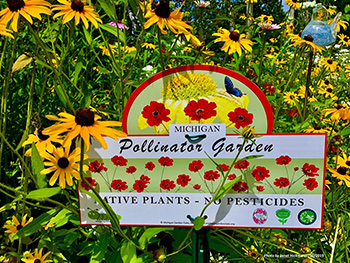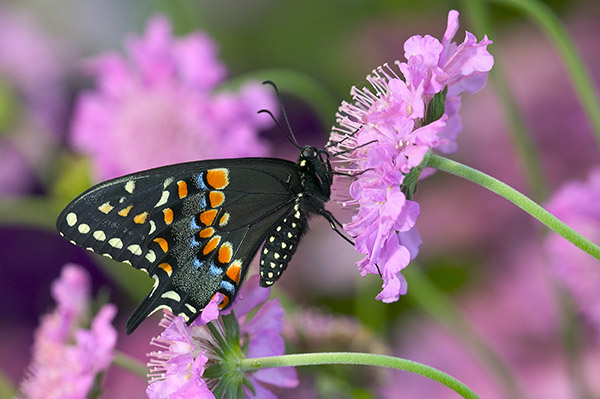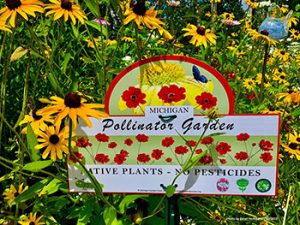
Planting native plants is key to supporting our partnership with Homegrown National Park a grassroots initiative to restore the biodiversity and ecosystem function in our gardens by adding native plants. Michigan’s agricultural economy depends on pollinators and 1 out of every 3 bites of food we eat requires pollination to produce. While much has been done to promote awareness of the importance of all pollinators to the overall health of our eco-system and to Michigan’s agriculture/floriculture industry, it is incumbent on each and every one of us to stand up and BEE counted for recognizing and acting upon the fundamental importance of pollinators and what each of us CAN do, as individuals, to provide pollinator habitats, to preserve and protect one of our most important natural resources.
Michigan Pollinator Gardens
There are many things we can all do to create or improve pollinator habitats:
• Minimize or eliminate the use of pesticides in our gardens.
• Amend the soil to make it healthier.
• Plant native plants when possible.
• Recognize the need for and plant both host and nectar plants for a variety of pollinators.
Michigan Garden Clubs offers many specific programs and activities designed to help draw attention to the importance of pollinators so that together we can create an environment where they can thrive.
Education
We have an impact when we teach not only our youth about pollinators, but also our communities, and our legislators. While more difficult to measure than the number of pollinator gardens created, these efforts have a huge potential to make a lasting difference and fundamental change in how the public thinks about pollinators and connects them with the health of our environment. To that end, we promote working with youth and other organizations to teach an appreciation of gardening and the environment.
Educational Resources for Native Plants and Pollinators

Using a specific pollinator as a teaching example is an effective way to educate both our citizens and our youth about the importance of pollinators. Butterflies are both beautiful and important to our ecosystem. The Black Swallowtail (Papilio polyxenes) is especially important to Michigan. It is found throughout the entire state and it is a permanent resident of Michigan. It does not leave in the winter as many butterflies do. The Black Swallowtail overwinters in Michigan as a pupa, making it a great butterfly for school groups to study. Each Black Swallowtail lives 2+ weeks, with 2-3 generations per year.
Butterflies contribute to thriving ecosystems and are great pollinators. Not only are they objects of beauty in our world but they are a source of food for birds, reptiles, mammals and other insects. Butterflies are harbingers of the fragility of life on our planet. They are particularly sensitive to changes in our environment from the use of harmful pesticides and the loss natural habitat areas.
For more educational information, Contact:
Nancy Smith
PROJECTS
Michigan Garden Clubs
National Garden Club Projects


 Oudolf Garden Coming to Detroit
Oudolf Garden Coming to Detroit